 Petzlover
Petzlover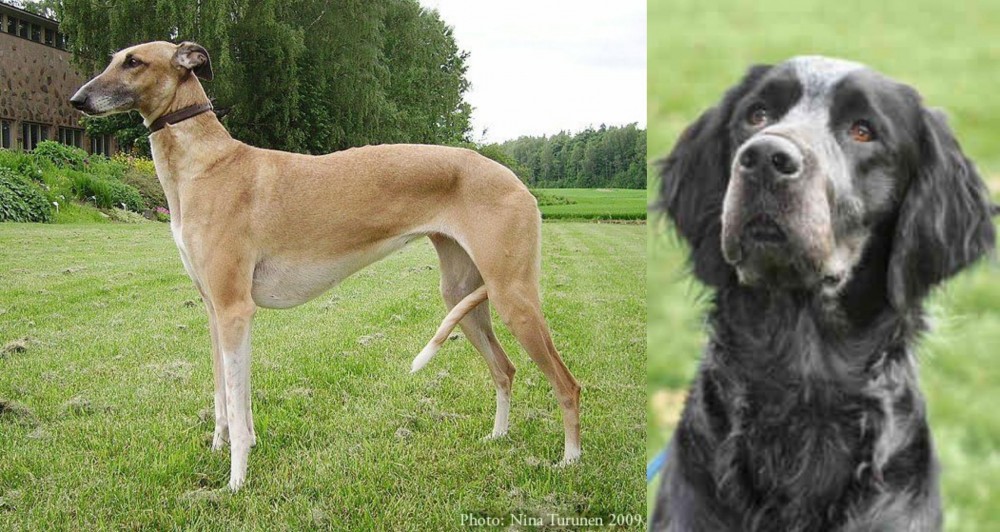 Hortaya Borzaya is originated from Russia but Picardy Spaniel is originated from France. Hortaya Borzaya may grow 14 cm / 6 inches higher than Picardy Spaniel. Hortaya Borzaya may weigh 10 kg / 23 pounds more than Picardy Spaniel. Both Hortaya Borzaya and Picardy Spaniel has almost same life span. Both Hortaya Borzaya and Picardy Spaniel has same litter size. Hortaya Borzaya requires Low Maintenance. But Picardy Spaniel requires Moderate Maintenance
Hortaya Borzaya is originated from Russia but Picardy Spaniel is originated from France. Hortaya Borzaya may grow 14 cm / 6 inches higher than Picardy Spaniel. Hortaya Borzaya may weigh 10 kg / 23 pounds more than Picardy Spaniel. Both Hortaya Borzaya and Picardy Spaniel has almost same life span. Both Hortaya Borzaya and Picardy Spaniel has same litter size. Hortaya Borzaya requires Low Maintenance. But Picardy Spaniel requires Moderate Maintenance
 The Hortaya Borzaya is an ancient sighthound from Asia with its origins in Kievan Rus = Grand Duchy of Lithuania = Polish-Lithuanian Commonwealth and the Empire of Russia. The Hortaya is a large dog, especially a long in body dog with a muscular build suitable for running fast. He is one of the most talented of sighthounds, able to track moving prey at quite great distances. He is an intensely active when running prey and quiet and well balanced when not working.
The Hortaya Borzaya is an ancient sighthound from Asia with its origins in Kievan Rus = Grand Duchy of Lithuania = Polish-Lithuanian Commonwealth and the Empire of Russia. The Hortaya is a large dog, especially a long in body dog with a muscular build suitable for running fast. He is one of the most talented of sighthounds, able to track moving prey at quite great distances. He is an intensely active when running prey and quiet and well balanced when not working.
In Asia and Russia, it is still a working hunting dog, hunting a variety of game such as Saiga antelopes, wolves, foxes, and hares. With tremendous endurance, the Hortaya can run at great speeds and great distances on the hunt. The Hortaya Borzaya is a long distance runner rather than a sprinter like the greyhound we are all so familiar with. He also needs very little rest between runs of up to 4 km. The Hortaya uses his sense of smell as well as sight in the hunt. They hunt solo, in pairs or in packs.
It was not until 2004 that the Hortaya was first exported to Europe and given full breeding papers. They went to Germany, Slovakia and the Czech Republic in 2004. They went to Switzerland and Finland in 2005 and to the United States around 2005. Prior to this the Hortaya Borzaya was bred only in its original territory for thousands of years.
Unlike Western breeding programs, the Hortaya is not bred for the purpose of improving the breed. Like Asian thoroughbred horses the breed is considered “finished”. Because of this there was no inbreeding, linebreeding or incest. This is true for about 4-6 generations of a line. This helps the breed to stay healthy.
The breed was developed centuries ago being bred by many different groups of people throughout the region, making it impossible to say exactly where and how this Central Asian/Afghanistan/ southern Russian breed developed. The Russian Kynological Federation (RKF) member of the FCI, developed a standard for the Hortaya Borzaya, which unlike most breed standards, does not tell you what the Hortaya must be like. Instead it tells you what he cannot be.
It gives boundaries that the dog must fit inside in order to be considered a Hortaya Borzaya. This is because the breeds of these dogs in their native territories want to preserve as many different types and sub-types as possible under the banner of one breed. To most people these dogs would look like very different breeds. For this reason, they have not been accepted into International Breed Groups and Associations. The breeders of these dogs do not want to be tied down to one standard. They do not want the breed to be separated into western lines and the original line or show lines and working lines. They wish to keep all the dogs within one grouping.
The breed is recognized on the national level by the originating countries and federations, including Russia’s. There are an estimated 2500-3500 dog of this breed in existence to day. Only a few dozen of the breed exist outside of the original countries. In other Eastern and European countries, the dogs may be registered with hunting associations instead of a breed association.
The breed is held mostly by hunters in remote, local areas and villages that are fairly isolated. Here the Hortaya is seen as a partner in feeding the hunters family and the dog is invaluable. In these remote areas a good hunting dog is equal in value to the good horse. Both are essential to the hunter and his family’s livelihood.
The Hortaya Borzaya is a pack dog and does well with the family as well as an athletic hunter. They hunt in packs, small groups or alone and bring their catch back to the hunter for the family meal. No hunter had to go with the dog. In fact, the hunters would send the dogs several times for food. The Hortaya might travel for miles across tough terrain to get food for the family.
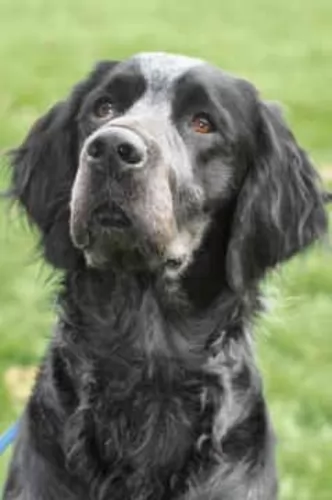 The Picardy Spaniel hails from France and has always been used as a gundog, having been crossed with different British hunting dogs.
The Picardy Spaniel hails from France and has always been used as a gundog, having been crossed with different British hunting dogs.
While this dog breed is related to the Blue Picardy Spaniel, the Picardy is the older of the two breeds. It has always been sought after by the French nobility for its hunting skills and the fact that its weather resistant coat allowed it to hunt in all kinds of weather conditions.
The dog’s popularity waned in the early 20th century. The UKC have recognized the Picardy Spaniel as a Gun Dog and the breed has also been accepted within the FCI as a Pointing dog group.
 This athletic sighthound is a handsome dog, ranging from large to giant. Remember there are many different ‘types’ of dogs within the one line/breed of Hortaya. Breed standards are exclusionary, and performance based rather than inclusionary, and appearance based. Still most of the breed lines share many of the same traits.
This athletic sighthound is a handsome dog, ranging from large to giant. Remember there are many different ‘types’ of dogs within the one line/breed of Hortaya. Breed standards are exclusionary, and performance based rather than inclusionary, and appearance based. Still most of the breed lines share many of the same traits.
They are a long legged breed with a very deep chest and flexible spine. They have immensely strong lungs and a narrow but long skull. Their gait is fluid, effortless trotting when not hunting. When she is hunting, they gallop like a horse and cover a lot of ground.
There eyes are usually black but can be any color and their fur is also any color. It is thick and dense. Finally, in the 2000’s, there were some dogs in a subline exported to Europe and to North America. Here, for this subgroup, a standard was established based on appearance and the color or the coat was now set at only white, blue, black, cream, red, sable and brindle, and piebald. They might or might not have a saddle. Definition of this type is still going on and has not been entirely settled yet. This standard is only for the European and American market show dogs.
These dogs, bred for show, have the same ability to run like the wind and for a very long time with his muscled body and long legs. The breed has strength and stamina that will fool you. He also has a long neck and broad back. He has thin, short ears.
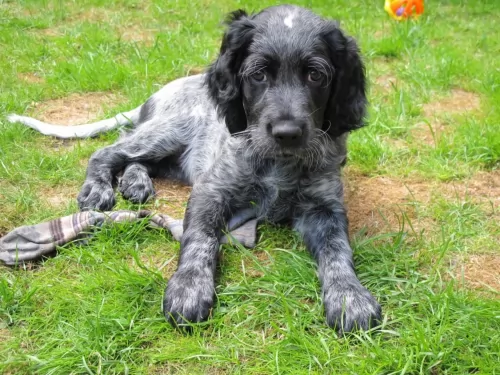 The Picardy Spaniel is larger than other spaniels. It is described as a medium sized dog, standing at 56 – 61cm in height and weighing between 20 and 25 kilograms. The body of the spaniel is squarely built and muscular body. The dog has long floppy ears and the coat which is shortish in areas except for feathering around the legs and belly can vary in colour from red to chestnut brown to sandy and chocolate. The tail is long and feathered.
The Picardy Spaniel is larger than other spaniels. It is described as a medium sized dog, standing at 56 – 61cm in height and weighing between 20 and 25 kilograms. The body of the spaniel is squarely built and muscular body. The dog has long floppy ears and the coat which is shortish in areas except for feathering around the legs and belly can vary in colour from red to chestnut brown to sandy and chocolate. The tail is long and feathered.
The Picardy Spaniel is a docile breed of dog and makes a great family pet, loving being playful with the children in the home and getting on well with other dogs. He is gentle but sociable and intelligent too and is easy to train and socialize.
Although he has been used as a hunting dog he can slot into life in the city or the countryside. He can be indoors or outdoors and still be happy, so long as his family members are close by.
He is an active dog though, and won’t be content to be sitting around for too long, loving nothing more than to be chasing a ball or going for a walk with you.
 Children friendliness - yes, they are very good with children and will play with them for hours.
Children friendliness - yes, they are very good with children and will play with them for hours.
They have tremendous stamina, speed and intelligence to hunt on their own without the hunter and bring the prey back in good shape for the hunter’s family to eat.
No they are not very adaptable in terms of living arrangements. They will not do well in an apartment and probably not in the city as they need land to run.
Learning ability yes, they are intelligent and learn easily.
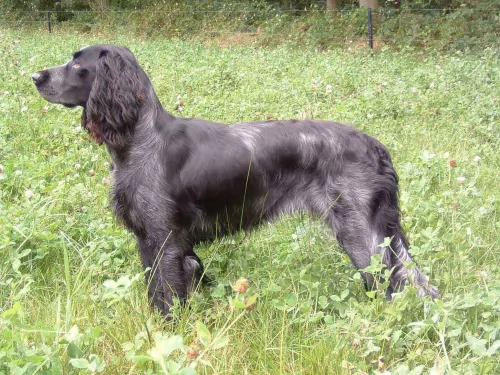 The Picardy Spaniel is a docile dog who forms strong bonds with his human family.
The Picardy Spaniel is a docile dog who forms strong bonds with his human family.
He doesn’t gel easily with strangers though, but socialization and training will at least make him well behaved among strangers.
A well-mannered Picardy Spaniel is a joy in the home, and this gentle dog is guaranteed to make you the most wonderfully loyal and loving pet and companion.
 As previously mentioned, the original breed is isolated and therefore has a pretty good health track record. Most of the breed specific illnesses or conditions that usually are inherited barely exist in this breed.
As previously mentioned, the original breed is isolated and therefore has a pretty good health track record. Most of the breed specific illnesses or conditions that usually are inherited barely exist in this breed.
They have a propensity toward obesity and diet is essential to prevent other issues.
Chronic or acute pancreatitis is possible because the breed developed eating small meals and hardly any meat. Too much meat or fat could cause this.
No tolerance for high protein dog food. Can cause puppies to have life threatening damage to bones and cartilage that is irreversible.
Bloat – because of the deep chest and the intolerance for large meals they are prone to bloat.
 Without any major health issues, your Picardy can reach 14 years of age and possibly even older. A couple of common dog conditions to be on the watch for include:
Without any major health issues, your Picardy can reach 14 years of age and possibly even older. A couple of common dog conditions to be on the watch for include:
Your beautiful Picardy Spaniel has floppy ears and this opens up the tendency to suffer with ear infections. The inside of the ears are moist and hot and you as the dog owner can try to keep the inside of the ear clean and dry.
He is a dog that loves water too, and swimming encourages dampness. If you prefer not to work on the inside of the ears, dog groomers or your vet can clean the ears for you. An ear infection can be painful for your pet and it will require veterinary intervention.
These are dogs which can pick up weight quite easily. Dogs which are overweight are more prone to developing cancer, diabetes and heart disease, not to mention joint problems.
Other problems to look out for include cancer, bloat, dental disease and parasites.
 As mentioned above do not overfeed a Hortaya Borzaya puppy. There is serious risk of irreversible damage if you do. Feed small meals 3-6 times a day with lower protein.
As mentioned above do not overfeed a Hortaya Borzaya puppy. There is serious risk of irreversible damage if you do. Feed small meals 3-6 times a day with lower protein.
3 cups of an average protein high quality dog food served at least 3-4 times per day. To avoid bloat do not feed large meals before or after exercise and don’t let your dog drink a lot of water at one time.
This is an extremely active dog bred to hunt 5-6 times a day over wide expanses of various and rough terrain. They need exercise. If you run, they will run with you happily and they will outlast you. They are good at and enjoy fetch, chase, agility, and field trials. They will last hours at any game they play.
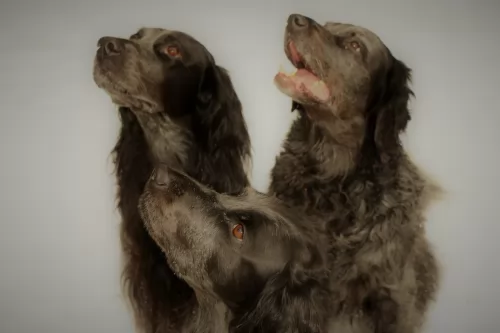 Your Picardy has a thick coat which sheds and the coat should be brushed at least twice a week to prevent matting. The ears of the Picardy Spaniel require special attention. Because they are long they will need to be cleaned and kept dry otherwise an ear infection can develop.
Your Picardy has a thick coat which sheds and the coat should be brushed at least twice a week to prevent matting. The ears of the Picardy Spaniel require special attention. Because they are long they will need to be cleaned and kept dry otherwise an ear infection can develop.
At the same time, check your pet over for ticks and fleas, check his eyes, keep the nails trimmed, and check inside his mouth for rotting teeth which can be the source of many health problems if left untreated.
If you have a puppy, you will need to provide 4 bowls of food in a 24 hour period. Check on the directions provided on the food packaging to see how much to feed your puppy.
By the time your Picardy is one year of age, he can move over to 2 bowls of food a day. Only the highest quality commercially manufactured food will be good enough for your dog. Food and its quality impacts the health and longevity of your pet.
Apart from dry kibble, try and provide some home-made food, keeping it as simple as possible. Dogs thrive on simple, consistent foods. Chopped up boiled chicken, brown rice, sweet potatoes, spinach and carrots added to the kibble now and then will thrill your pet. Occasionally you can also add in some raw meat.
Avoid feeding your dog things like coffee, chocolates, popcorn, nuts and onions as all these will just upset your dog's digestive system. The secret is to keep things simple and nutritious.
Make sure your pet always has access to fresh, cool water.